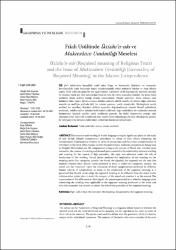Fıkıh Usûlünde İktizâu’n-nâsve Muktezânın Umûmîliği Meselesi
Abstract
Şer’î hükümlere kaynaklık teşkil eden Kitap ve Sünnetteki ifadelerin ve muamelat konularındaki irade beyanının doğru anlaşılmasındaki etkisi nedeniyle lafızlar ve Arap dilinin yapısı, fıkıh usûlünde geniş bir yer işgal etmiştir. Lafızların tahlili kapsamında üzerinde durulan ve oldukça önem arz eden konulardan birisi de lafız ile mâna arasındaki ilişkidir. Bu konu, fıkıh usûlünde lafzın delâleti başlığı altında incelenmiştir. Hanefi usûlcüler, lafzın mânaya olan delâletini ibâre, işaret, iktizâ ve nassın delaleti şeklinde dörtlü tasnifle ele alırken diğer usûlcüler mantûk ve mefhûm şeklinde ikili bir taksim yapmayı tercih etmişlerdir. Mezheplerin tercih ettikleri bu tasnifleri, iktizânın delâleti açısından değerlendirecek olursak Hanefî usûlcülerin muktezâyı telaffuz edilen lafızdan farklı kabul ettiklerini, diğer usûlcülerin ise muktezâyı mantûk kategorisine koyarak melfûz kabul ettiklerini görürüz. Bu farklı düşüncenin pratiğe olan yansıması lafza ilişkin dil kurallarının söze takdir edilen mânada geçerli olup olmadığında görülür ki bahsi geçen bu tartışma muktezânın umûmîliği başlığında tartışılmıştır. The structure and wording of Arabic language occupied significant places in the study of usûl al-fiqh (Islamic jurisprudence procedure) by virtue of their effects enhancing the interpretation of declarations of intent in terms of transactions and the correct comprehension of references to the Book (Holy Quran) and the Sunnah (Islamic traditions and practices dating back to Prophet Muhammad and His companions) acting as the sources of Sharia law. Another issue stressed in the context of wording and deemed quite essential is the relationship between wording and meaning. In the context of fiqh procedure, this topic was addressed under the title of implication of the wording. Hanafi jurists analyzed the implication of the wording on the meaning under four categories, namely, the literal, the signaled, the supposed and the nass (the explicit) whereas other Islamic jurists preferred to study it under two categories, namely, the stated and the conceived. Upon the evaluation of these categorizations preferred by different Islamic schools of jurisprudence in terms of the implication of the supposed meaning, it is perceived that Hanafi jurists adopt the supposed meaning to be different from the stated words whereas other jurists place it under the category of the stated and consider it as the uttered. The repercussion of this difference in thinking for the practice pertained as to whether language rules concerning the wording were applicable to the supposed meaning attributed to the word, and thus this discussion was carried out under the title of the generality of the supposed meaning.
Source
İslami Araştırmalar DergisiVolume
31Issue
2URI
https://app.trdizin.gov.tr/makale/TXpnek5ETXdNQT09/fikih-usulunde-iktizau-n-nasve-muktezanin-umumiligi-meselesihttps://hdl.handle.net/20.500.12809/9062


















